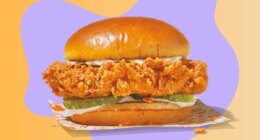With that said, could it be possible that your daily java or matcha intake is helping or hurting your head pain and throbbing? Or, if you lay off these stimulating bevs for whatever reason, could it be worth giving them a go for relief? We asked Brooklyn-based dietitian Maddie Pasquariello, MS, RDN, to spill the (coffee) beans on the link between caffeine and migraines.
How caffeine affects migraine pain
To start, Pasquariello calls out the interplay between adenosine (a neurotransmitter that encourages rest), caffeine, and migraines in terms of neurological activity. “Adenosine is known to inhibit parts of the nervous system. It regulates our sleep-wake cycles, but is also involved in arousal, attention, pain regulation, and focus,” she says. When caffeine’s in your system, it inhibits adenosine’s ability to bind to adenosine receptors. The result? More alertness, but also the potential for pain relief. In fact, you may have noticed that caffeine is often added to OTC pain and migraine relievers for this very reason.
When caffeine’s in your system, it inhibits adenosine’s ability to bind to adenosine receptors. The result? More alertness, but also the potential for pain relief. In fact, you may have noticed that caffeine is often added to OTC pain and migraine relievers for this very reason.
“Caffeine has noted effects in boosting the analgesic [i.e., pain-alleviating] effects of OTC pain relievers like ibuprofen,” Pasquariello explains. The mechanisms by which this happens are unclear, yet she notes that the stimulant’s role as a competitive antagonist of adenosine receptors is a factor. “Other possible mechanisms include improving the absorption of ibuprofen by lowering gastric pH or by increasing blood flow, or possibly simply due to lower perceived pain thanks to caffeine’s role in enhancing mood.”
So does caffeine help migraines or cause them?
Based on the info above, it seems as though caffeine is more helpful than harmful for migraine relief. But as with most things, it’ll depend on a variety of extenuating factors, such as:
- How much caffeine you consume
- How often you consume caffeine
- Your personal tolerance for caffeine
- Additional health conditions you have and/or medications you take
Yet according to a 2020 review of over two dozen studies on caffeine and migraine published in the journal Nutrients, “all treatment studies found caffeine to be safe and effective in acute migraine treatment, mostly in combination with other analgesics.” The authors added that there’s insufficient evidence to date suggesting to cease caffeine intake for the sake of migraine relief… with a few important caveats.
First, those who suffer from migraine should limit their caffeine intake to 200 milligrams daily, which is the equivalent of around two 8-ounce cups of coffee. However, Pasquariello says that if you rarely consume caffeine, you shouldn’t meet this daily threshold straight away as it could potentially cause a migraine.
Second, caffeine withdrawal was found to trigger migraines in up to 30 percent of participants. So on the flip side, it’s not ideal to drastically reduce your caffeine intake overnight or go cold turkey. While Pasquariello says that very high caffeine consumption is linked to an increased risk of migraine, you’ll be better off slowly reducing your intake until you reach the 200-milligram limit. “If you are looking to reduce your overall caffeine intake and fear headaches or triggering a migraine, make sure you do so safely and in conjunction with your medical team,” she advises.
The takeaway on caffeine and migraines
“The general consensus is that by keeping intake fairly low and consistent over time, one can avoid having caffeine intake [negatively] affect migraine severity,” Pasquariello says. In other words, your morning coffee or matcha latte groove is unlikely to make your migraines worse.
“The general consensus is that by keeping intake fairly low and consistent over time, one can avoid having caffeine intake [negatively] affect migraine severity,” Pasquariello says. In other words, your morning coffee or matcha latte groove is unlikely to make your migraines worse.
Pasquariello also mentions that stress, bright lights, and a poor night’s rest are major migraine triggers, which can sometimes circle back to caffeine. “Since you are more likely to drink coffee if you are suffering from a lack of sleep—and many of us do so when we are stressed as well—you may blame your caffeine intake when lack of sleep or stress levels were the primary trigger,” she shares. With that in mind, caffeine might not be the root cause, so be mindful of overlapping instigating factors to inform your migraine prevention protocol.
Source




